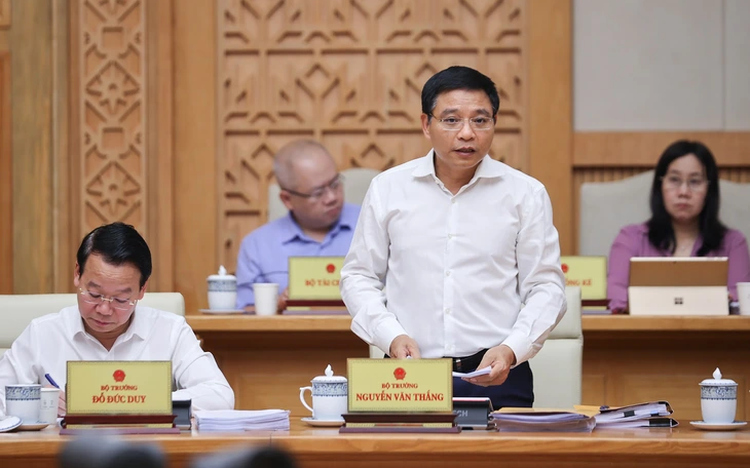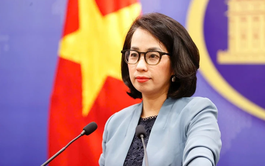
Vietnam’s Minister of Finance Nguyen Van Thang (standing). Photo: Vietnam Government Portal
Speaking at the government’s regular June meeting on the afternoon of Thursday, Thang also reported that Vietnam's economic growth had reached its highest level in nearly two decades, with significant improvements across key indicators related to production, business activity, and the state budget.
Party General Secretary To Lam recently held phone talks with U.S. President Donald Trump, during which both sides reaffirmed the comprehensive strategic partnership between Vietnam and the United States.
They also discussed major directions and measures to boost bilateral cooperation, particularly in key and breakthrough areas such as high technology and science, the minister informed.
“This is a significant outcome of the negotiations, fostering trust and expectations among businesses,” Minister Thang stated.
Alongside diplomatic progress, Vietnam's economy has shown promising results. The processing and manufacturing industry grew 10.65 percent in the first half of 2025, reaching the target.
This marks one of the few times since 2011 that six-month growth in this sector has hit double digits.
Exports increased 14.4 percent, with an estimated trade surplus of US$7.63 billion.
Realized foreign direct investment (FDI) reached over $11.7 billion, up 8.1 percent year on year.
The number of newly established and re-registered businesses in the first half of the year stood at 152,700, 20 percent higher than the number of businesses that exited the market (127,200).
June alone witnessed a record number of nearly 24,400 newly registered businesses with combined registered capital of nearly VND177 trillion ($6.7 billion), rising 60.5 and 21.2 percent, respectively, compared to the same period last year.
Minister Thang also highlighted that on June 30, all 34 cities and provinces simultaneously held ceremonies to announce decisions regarding the restructuring of local administrations into a two-tiered system, including provinces/cities and wards/communes, starting July 1.
“This marks a new phase in the development of the state administrative apparatus, streamlining and enhancing the institutional structure and political system for greater efficiency,” Thang remarked.
He also emphasized that public trust and pride have increased, creating fresh momentum for the country to enter a new era.
Ongoing economic challenges
Despite the positive indicators, the outlook remains cautious. Vietnam’s economy is expected to face further challenges ahead, requiring all agencies and localities to act with greater proactiveness and determination to fulfill assigned tasks, said Minister Thang.
The Ministry of Finance outlined several key difficulties: the 2025 growth target remains challenging, and macroeconomic management continues to face pressures, especially regarding exchange rate and interest rate policies.
Although institutional and legal reforms are underway, they still lag behind development demands. Moreover, a segment of the population and workforce continues to experience hardship.
Thang emphasized the urgency of submitting and effectively implementing new government directives.
Authorities will closely monitor the operations of the two-tiered local administration system, ensure timely guidance on decentralization and delegation of authority, and resolve remaining obstacles.
Efforts will continue to expand exports, develop sustainable and balanced trade relations with global partners, and improve the legal framework and business environment.
The government also aims to stimulate traditional growth drivers—investment and domestic consumption—while developing new engines of growth.



Max: 1500 characters
There are no comments yet. Be the first to comment.